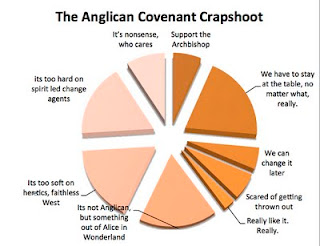Michigan has its say
And now Michigan's deputation has made its collective judgement known. Another diocese says no to the so-called covenant.
Response to the Anglican Covenant
General Convention Deputation
Diocese of Michigan
The Deputies and Alternates to the 77th General Convention met on March 10 to consider the Anglican Covenant and the accompanying Study Guide. Our response to the proposed Covenant comes in seven parts:
Our first response to the Anglican Covenant is to affirm fellowship and communion.
Such unity as these words imply is our highest good and perhaps our greatest blessing. We uphold, stand for, honor and thank God for communion.
Our second response is to ask how we can newly enter into a relationship in which we already stand and have been enjoying for some time. Just as one would not ask people long married to enter into a newly-written contract of marriage, nor ask members of a family suddenly to enter into a contract of kinship, neither can we understand why or how we could suddenly attempt to do so among our sister and brother Anglicans around the world. We believe the effort is redundant, and indeed, perhaps even dishonors the reality in which we live.
Our third response is to question the appropriateness of “Covenant” as a model for ecclesial relations. To quote from materials prepared by the Standing Commission on Liturgy and Music, “’Covenant” implies a superior who offers the covenant and a subordinate who accepts it. So God extends the covenant to Israel and Israel is bound to the terms of God's covenant. As applied to the relationship between God and Israel and between Christ and the Church this implication is foundational.” Because “Covenant” implies a hierarchical relationship, the term is inappropriate when used to describe the network of relationships between co-equal and autonomous national churches.
Our fourth response is to suggest that the Covenant document creates an international bureaucratic superstructure whose existence is at odds with the longstanding autonomy of national churches. To give juridical, disciplinary authority to super-national bodies contradicts the foundational impulses that led to the establishment of the Church of England in the sixteenth century. We believe that the Constitution of the Anglican Consultative Council already serves as a warrant for fellowship, communion, and ministry between the churches of the Anglican Communion.
Our fifth response is to affirm the vocation of the Episcopal Church in the full inclusion of all its members in all orders of ministry and the full access of all its members to its sacramental rites. Since 1979, the Episcopal Church’s baptismal covenant has included a promise to, among other things, “respect the dignity of every human being.”
Our sixth response is to express our fervent hope that the Anglican Covenant process may be an occasion to refocus our national and international energies on mission and ministry. The challenges facing us together and severally are profound. We believe that energy expended on the disciplinary processes outlined in section four would be better spent in proactive ministry to the poor, the oppressed, and those who have yet to hear the Gospel.
Our seventh and final response is to reaffirm that we are in relationship already with one another, quite apart from signing or not signing a document. Are we not the Body of Christ, and individually members of it? As the eye cannot say to the ear, "I have no need of you", nor the hand to the foot, neither can we deny what is our heritage, reality, hope, and destiny. The Covenant that binds us together is the mutuality of our ministry and accountability conferred in Baptism. The Baptismal Covenant that binds us together is no imperfect human creation. The Baptismal Covenant by which we are bound one to another is the one, perfect, eternal covenant given us by God in Christ. On that covenant we delight to stand; in that communion, second to none, we are proud to serve.
For these and other reasons, we recommend against adoption of the Anglican Covenant by the Episcopal Church.
Find on our resources page
Labels: Anglican Covenant, Diocese Respond





